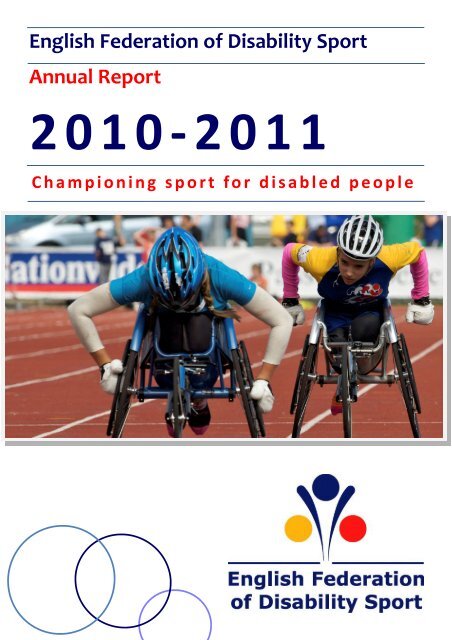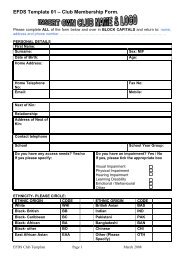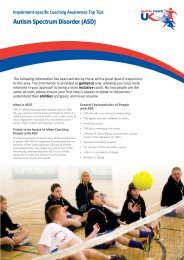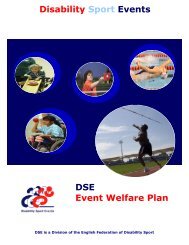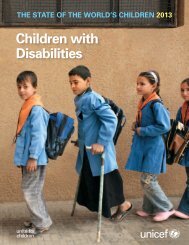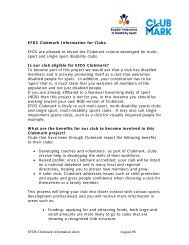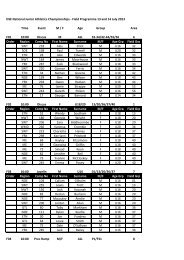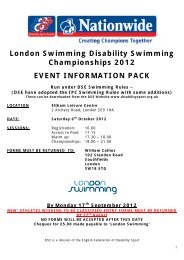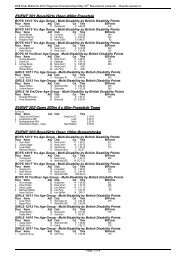EFDS annual report 2011 - English Federation of Disability Sport
EFDS annual report 2011 - English Federation of Disability Sport
EFDS annual report 2011 - English Federation of Disability Sport
Create successful ePaper yourself
Turn your PDF publications into a flip-book with our unique Google optimized e-Paper software.
<strong>English</strong> <strong>Federation</strong> <strong>of</strong> <strong>Disability</strong> <strong>Sport</strong>Annual Report2 0 1 0 - 2 0 1 1C h a m p i o n i n g s p o r t fo r d i s a b l e d p e o p l e
Contents– Annual <strong>report</strong> 2010-11Message from our Chair– Baroness Tanni Grey-Thompson DBE 5Overview 6-7Strategic focus 8-9Insight and research 10-11Supporng the sports sector 12-13Club development 14-15Regional networks and local impact 16-17Projects and programmes 18Typhoo <strong>Sport</strong>s for all 19Events programme 20-21Inclusive Fitness Iniave 22-25Promong our work 26-27Engaging the disability sector 28Funding our work 30-31
In 2008/09, just 6.1 per cent <strong>of</strong> disabled over-16stook part in at least 30 minutes <strong>of</strong> sport or physicalacvity three or more mes a week, compared to16.6 per cent <strong>of</strong> non-disabled adults.
5Message from our ChairI am delighted to welcome you to our 2010/<strong>2011</strong> Annual Report.Although I only took the role as Chair up in December 2010, the me spent with the <strong>English</strong>Federaon <strong>of</strong> <strong>Disability</strong> <strong>Sport</strong> has been filled with challenges and posive change. I waspleased to be able to give up some <strong>of</strong> my me to the important cause and support moredisabled people to enjoy sport like I have in my career.With a Paralympic Games on home soil in 2012- now is such an excing me to be involvedin sport. As we all strive for an ever lasng legacy in sport for disabled people- organisaonslike the <strong>English</strong> Federaon <strong>of</strong> <strong>Disability</strong> <strong>Sport</strong> have an important role to play. Our worktowards equality in sport means disabled people will be able to access more posiveopportunies in sport or physical acvity- if and whenever they choose.We have the best chance ever to make the year leading up to the Games a real catalyst toincrease parcipaon on every level- not just for the current Paralympians but for thosewho will be inspired long aer. The investment by <strong>Sport</strong> England in us as a naonal equalitypartner recognises the incredible passion and experse which underpins <strong>EFDS</strong> and thedisability sports organisaons.In this <strong>report</strong>, you will read about the excellent work carried out throughout the yearending March <strong>2011</strong>. I look forward to seeing <strong>EFDS</strong> build on this and hope our partners joinus in engaging more disabled people to enjoy the benefits <strong>of</strong> sport.Baroness Tanni Grey-Thompson DBE
A year <strong>of</strong> changeThis year marked another busy me within the organisaon. In May 2010 our new ChiefExecuve Barry Horne took up his post at a new locaon for <strong>English</strong> Federaon <strong>of</strong> <strong>Disability</strong><strong>Sport</strong>- <strong>Sport</strong>Park, Loughborough. Starng with Barry was a Director <strong>of</strong> Corporate Services,Paul Kinsella, followed in August by a Director <strong>of</strong> Development, Chris Ratcliffe. The newsenior team meant we were ready for a shi in our strategic focus and a new naonal <strong>of</strong>ficeamongst other sports bodies.Even though the main grant from <strong>Sport</strong> England was secured for 2010-<strong>2011</strong>, it sll meantwe had a number <strong>of</strong> challenging targets to achieve in the year. One included another majortransion in the <strong>EFDS</strong> staffing resource.From January through to March <strong>2011</strong>, there was significant restructuring following theorganisaonal review. All seven regional <strong>of</strong>fices were closed and the partnership andPlayground to Podium teams were integrated into a new naonal sports developmentteam. Ten employees le the organisaon through redundancy on 31 March <strong>2011</strong>.During the year, there were also a number <strong>of</strong> changes to the <strong>EFDS</strong> board <strong>of</strong> trustees. Fivemembers <strong>of</strong> the board le in 2010, including the Chair who had been in post for two years.A new Chair- Baroness Tanni Grey-Thompson DBE led the board from December 2010 withtwo new Directors who were co-opted in at the same me- Charles Reed and TraceyMcCillen. They joined the growing group <strong>of</strong> experienced board members to lead <strong>EFDS</strong> intothe new financial year. Early in <strong>2011</strong>, we promoted externally the opportunity to join ourboard- with addional colleagues starng on 2 April.From this date the board consisted <strong>of</strong>:Baroness Tanni Grey-Thompson DBE (Chair)Charles Reed (co-opted and subsequently appointed as Vice Chair)April BarreKen BlackMary ButlerLiz NealeJudith Russell MBESteve TownLee MasonTracey McCillen (co-opted)
7As part <strong>of</strong> our compliance obligaons as a <strong>Sport</strong> England funded naonal partner, we alsoreviewed our organisaonal governance policy and process.In 2010 all organisaonal human resource related policies, processes and procedures werereviewed and updated. Supervised by specialist HR and legal pr<strong>of</strong>essionals, the task ensuredall our people-related acvies were fully compliant with all relevant UK legislaon andregulaons. The result in February <strong>2011</strong>- a new and enhanced employee handbook andguidance document.We installed a new ICT system in October 2010, which enhanced work access and flexibility.Although we now only have two main <strong>of</strong>fice bases, all staff have the facility to workremotely should the need arise and at meengs and events.For the staff who remained in post or were reposioned into the naonal team, it has alsobeen a challenging me to see their colleagues leave, but they had an immediate need torefocus and deliver a ght work programme. This atude and sheer determinaon tosucceed has to be praised. As our most valuable asset, the staff connue to provide theexperse and passion we require.
Strategic focusThe <strong>English</strong> Federaon <strong>of</strong> <strong>Disability</strong> <strong>Sport</strong> (<strong>EFDS</strong>) was established in September 1998 as thenaonal body and charity dedicated to disabled people in sport throughout England.We work closely with a number <strong>of</strong> key partners to improve and increase the opportunies<strong>of</strong>fered, ensuring disabled people have a memorable experience <strong>of</strong> sport and physicalacvity. Our partners include the Naonal <strong>Disability</strong> <strong>Sport</strong>s Organisaons (NDSOs)recognised by <strong>Sport</strong> England, who form part <strong>of</strong> our membership.VisionEquality in sport and physicalactivityMissionTo be the strategic lead for sportand physical activity for disabledpeople in EnglandOur seven aims are:• We will be the leading centre for commissioning specialist market knowledge andevidence led insight, in order to drive increased parcipaon in sport and physicalacvity by disabled people.• Provide advice and bespoke support to Naonal Governing Bodies <strong>of</strong> <strong>Sport</strong> in theirwork to increase parcipaon in sport and meet their whole sport plan strategicoutcomes.• Engage with other key naonal partners to harness resources and secure disabledpeople parcipaon increases through NGBs and other delivery partners.• Encourage and challenge key sports delivery agencies to demonstrate equality inservice delivery, whilst monitoring their progress in growing parcipaon in the sector.• Coordinate and ensure effecve planning in other support organisaons in seeking andapplying resources which deliver intervenons in the field <strong>of</strong> disability sport toincrease both supply and demand.
9• Lead the disability sport sector, speaking as the single voice in England and representand serve disabled people and our members effecvely, harnessing their skills andexperse.• Ensure all our acvies are carried out with effecve corporate governance andcontrols (ensuring diligence, probity, equality and environmental awareness) in orderto meet funder agreements and represents best possible value for money.Our ValuesIn all that we do, we will draw upon the following values:• Equality for all• Customer commitment, enabling choice and delivering connuous improvement• Drawing from a strong knowledge base and insight delivering change throughinfluence• Opmising the opportunies that charitable status brings
Insight and researchFulfilling partner needsIn 2010 our commissioned research found that, based on current roles and relaonships,NGBS have five broad needs that need to be addressed if we are to develop our work withdisabled people. These were:• Informaon and advice• Engagement support in how to idenfy, reach and work more closely with disabilityorganisaons and individuals• Paralympic support for talent idenficaon and to ensure the Paralympic sports have aplayer pathway• Training- including building the capacity <strong>of</strong> NGB in-house training teams to deliverdisability equality or important awareness training• Access to <strong>EFDS</strong> projectsLife Opportunies SurveyDuring 2010 the Life Opportunies Survey Interim Report was released by the Office forNaonal Stascs. This was a new large scale survey <strong>of</strong> disabled people and althoughcovering the whole <strong>of</strong> Great Britain, it contained key findings related to sport:• 72 per cent <strong>of</strong> adults with impairments did not play sport as much as they would liketo compared to 52 per cent <strong>of</strong> adults without impairments• 35 per cent <strong>of</strong> adults with impairments <strong>report</strong>ed that they were too busy or did nothave enough me to play sport as much as they would like to, compared with 71 percent <strong>of</strong> adults without impairments.• The findings <strong>of</strong> this <strong>report</strong> were supported by the latest <strong>Sport</strong> England parcipaonfigures- Acve People Survey 4- which showed that sports parcipaon among “adultswith a liming disability/illness” had decreased naonally from 6.7 per cent in AcvePeople 3 to 6.5 per cent in December 2010.<strong>EFDS</strong> uses this survey as an important benchmark for other research within theorganisaon.Parcipaon and sasfacon pr<strong>of</strong>ilesAs part <strong>of</strong> our support for Naonal Governing Bodies <strong>of</strong> sport and other partners, we
11created a series <strong>of</strong> insight <strong>report</strong>s. These enabled a greater understanding <strong>of</strong> disabledpeople’s current acvity in specific sports, both in parcipaon and sasfacon figures.They also equipped the partners with an insight into the current climate.The <strong>report</strong>s were compiled using data from <strong>Sport</strong> England’s Quality <strong>of</strong> Sporng Experiencesurvey 2009 and <strong>Sport</strong> England’s Acve People Surveys 1, 2 and 3. The research and analysisprovided a picture <strong>of</strong> the current paerns <strong>of</strong> disabled people’s sasfacon within sport,enabling specific targeng <strong>of</strong> certain sports and groups.Reviewing the role <strong>of</strong> Naonal <strong>Disability</strong> <strong>Sport</strong> Organisaons (NDSOs)In May 2010, we commissioned Yew Consulng to undertake a review <strong>of</strong> <strong>EFDS</strong> and Naonal<strong>Disability</strong> <strong>Sport</strong>s Organisaons (NDSOs) and to idenfy how they can work together in thefuture to provide a ‘united voice and support service for the sports sector’. The focus <strong>of</strong> theresearch and consultaon was to idenfy the way forward and opons to improvegovernance and management systems.Several recommendaons were made as a result <strong>of</strong> the review. They were based on <strong>EFDS</strong>,NDSOs and <strong>Sport</strong> England agreeing and adopng a set <strong>of</strong> core principles with the top linebeing a shared long term objecve for inclusion.This was not just about <strong>EFDS</strong> and the NDSOs working beer together. It was a me foreveryone to agree one way forward and to decide their part in the future delivery. Thereview subsequently helped to inform the Inclusive <strong>Sport</strong> bid to <strong>Sport</strong> England.<strong>Sport</strong> leadership auditIn 2010 <strong>EFDS</strong> took part in a leadership audit <strong>of</strong> NGBs, led by fellow naonal partners WSFFand included Sporng Equals. 41 <strong>of</strong> the 46 funded NGBs took part. It focused on the keystascs which show:• 18.1 per cent <strong>of</strong> England’s populaon are disabled but just 50.7 per cent <strong>of</strong> disabledpeople are employed• Disabled people make up 9.1 per cent <strong>of</strong> England’s workforce, but just 6 per cent <strong>of</strong>the NGB workforce is known to have an impairment• At decision making levels there is limited representaon from disabled people
Supporting the sports sectorIn 2010, we carried out intensive research to understand our partners’ needs for oursupport. This began with asking Naonal Governing Bodies <strong>of</strong> sport (NGBs) and County<strong>Sport</strong>s Partnerships (CSPs). The results were vital to our vision to encourage disabled peopleto be acve at all levels. It helped us to give sports organisaons the right support neededwhen developing targets for disabled people in sport. In turn, we hope this will increaseparcipaon and provide more opportunies in sport for disabled people.During the financial year we organised NGBs into set levels <strong>of</strong> service. Level one receivingthe greatest level <strong>of</strong> advice and support over a period <strong>of</strong> me. We focused our aenon onacon plans with the sports to ensure their programmes included disabled people in thebest possible way.This meant providing key relaonship managers for the sports- in order for the requiredone-to-one support. Common needs have been advice on terminology, bespoke trainingand promong opportunies to disabled people.In March <strong>2011</strong> we organised an NGB workshop. Sixteen sports were represented as well asCSPs, local authories and the third sector to take part in interacve sessions. Drawing onboth the personal and pr<strong>of</strong>essional experse <strong>of</strong> disabled people working in the sector, theday focused on idenfying real praccal soluons to remove the praccal and theatudinal barriers in sport.The delegate feedback indicated the workshop would have an immediate impact on theirwork within their own NGBs. We aim to use this posive response to connue providingthis sort <strong>of</strong> service.
13Case study on swimming supportAs part <strong>of</strong> the on-going relaonship with Amateur Swimming Associaon (ASA),<strong>EFDS</strong> looked at ASA disability membership stascs to assist them in comparingthem against the Acve People Survey findings and highlight key areas to target forimprovement.We also worked with the ASA and Instute <strong>of</strong> Swimming in 2010 to develop thecontent for the online <strong>Disability</strong> Swimming Awareness Training Course- aimed atteachers, coaches, volunteers. This course was developed, approved and promotedthrough <strong>EFDS</strong> networks. It resulted in over 758 people compleng the course and inturn being adopted by Swim21.<strong>EFDS</strong> worked with Brish Swimming facilies to incorporate the <strong>EFDS</strong>’s InclusiveFitness Iniave- within their new swimming facilies accreditaon, which will berolled out later in <strong>2011</strong>.In addion to the partnership with ASA, Brish Swimming have developed andsigned <strong>of</strong>f a compeon framework in the hope <strong>of</strong> transferring responsibility from<strong>EFDS</strong> Events to Brish Swimming to deliver the naonal swimming championshipsinthe long term future.
Club developmentClub development was an important part <strong>of</strong> our work in 2010. During the year we saw eightmore clubs gain <strong>EFDS</strong> Clubmark Accreditaon- bringing our total to 10 clubs. <strong>EFDS</strong> ClubmarkAccreditaon is a mark for disability mul sport clubs or disability specific sports, which donot have an eligible governing body. Addionally we have 25 more clubs working towardsgaining accreditaon. A key part to this success was the <strong>EFDS</strong> Regional Managers workingclosely with the licensed County <strong>Sport</strong>s Partnership to support clubs through the processand work with disability organisaons such as Aconnaires.<strong>EFDS</strong> has played an acve role on the naonal Clubmark advisory group as the currentequality representave. This included the development <strong>of</strong> “Knowing your club and itscommunity” secon <strong>of</strong> the scheme as well as pooling equity partner’s feedback on theprogramme as part <strong>of</strong> the scheme’s <strong>annual</strong> review. This has supported a posiverelaonship with the current programme providers Knight, Kavanagh and Page.The <strong>EFDS</strong> Inclusive Club health check was updated in 2010 to reflect the changes <strong>of</strong>legislaon (Equality Act 2010) and the changing sporng landscape. A new dra <strong>of</strong> theInclusive Club toolkit has been developed and is currently being piloted in partnership with<strong>Sport</strong> Across Staffordshire (CSP). Monitoring and evaluaon data is due back in the autumn<strong>of</strong> <strong>2011</strong>. The health check has been a posive success both as a tool within the regions andsupport for the Coalfield Regeneraon Trust funded Inclusive Clubs Programme.Work has connued through the <strong>EFDS</strong> sport development advisors to include aspects <strong>of</strong> thetoolkit within their work for exisng club development models. The first NGB to embracethis was England Athlecs, who in March <strong>2011</strong> launched their own Inclusive Club HealthCheck- developed in partnership with <strong>EFDS</strong>. This document supports clubs with theirdisability acon planning but has also become part <strong>of</strong> their formal Clubmark accreditaon/reaccreditaon process.
15Inclusive Clubs programmeThanks to our partnership with the Coalfield Regeneraon Trust, <strong>EFDS</strong> was able todevelop a small grants programme to support local clubs to develop inclusivesports provision within Coalfield regeneraon areas within the North andMidlands areas.The programme focused on the Coalfield’s priority sports <strong>of</strong> athlecs, football,rugby and cricket as well as supporng mul-sport clubs to deliver these sports.Grants <strong>of</strong> up to £1,000 were available to each club to support an inclusiveenvironment by providing much needed funds for general club development,volunteer training and equipment.It successfully supported 19 sports clubs predominantly across the North <strong>of</strong>England. This resulted in 40 people being trained and over 550 disabledparcipants able to access an inclusive sports environment. Projects fundedincluded:• Wakefield Whirlwinds for the development <strong>of</strong> a new wheelchair rugby leagueclub in the area• Mullberry mul-sports club to develop their club markeng and revamp theirwebsite• Several cricket clubs across the North East to develop their individual clubsbut also work together on a disability cricket compeon• An athlecs club in Wigan received training, equipment and markengsupport to develop inclusive opportunies. Supported by the local sportsdevelopment unit, this project resulted in the development <strong>of</strong> a boroughwide iniave for inclusive clubs.
Regional networks and local impactThe <strong>EFDS</strong> regional <strong>of</strong>fices closed in March <strong>2011</strong>, aer serving their areas for many years. Weconnue to support the local delivery systems through a naonal team. The regional<strong>of</strong>ficers were in post during 2010-<strong>2011</strong> and <strong>EFDS</strong> strengthened the local sports strategy anddelivery for disabled people in a variety <strong>of</strong> ways.• Working in partnership with the County <strong>Sport</strong>s Partnerships (CSPs) to ensure strategiesand programmes are inclusive in design and implementaon• Assisng in seng up and running <strong>of</strong> county disability sport forums. These forums areused for informaon sharing between <strong>of</strong>ficers and projects. It is also an opportunity toinvite key people to present opportunies and ideas to the CSPs for advice anddiscussion.• Supporng funding bids such as Access to Volunteering- a successful North Westregional wide applicaon and a successful programme by Lancashire CSP. Plus, aregional powerchair football programme in the East and West Midlands to develop fivenew dedicated clubs and a regional league. A full me development post will beemployed in the region to support the bid. We also assisted Nongham City Councilwith their bid for mul sport clubs and sports leaders in the area.• Working to improve club development as highlighted through the CoalfieldRegeneraon Trust “Inclusive Clubs Programme”. Meanwhile in the East Midlands,Lincolnshire <strong>Sport</strong>s Partnership <strong>report</strong>ed they have had over 22,000 disabled peopleparcipang in the wheelchair sports programme, county inclusion project and theInclusive Fitness Iniave. There is on-going development with Naonal GoverningBodies including a growing network <strong>of</strong> local clubs.• Helping pull inclusion leads together for the purposes <strong>of</strong> specific projectse.g. Playground to Podium, School Games local organising commiees
17• Developing Disabled Leaders project which was developed with <strong>Sport</strong> Leaders UK. Thisproject was funded through nPower in the North East. It saw 25 tutors trained on the<strong>Sport</strong>s Leaders UK Inspired to Lead tutor courses and sign up to a programme <strong>of</strong>running leadership training for disabled people• To date 23 projects have been funded through the Accentuate project in the SouthEast. In total 12 club development and 11 Workforce development programmes. Wehave also funded five athlete bursaries as well as the training <strong>of</strong> over 50 coaches todevelop their skills in disability sport.• nPower North East <strong>Disability</strong> <strong>Sport</strong> Awards were held in March at the Durham CountyCricket Club. This was the eighth year <strong>of</strong> the awards ceremony and the event featuredseveral <strong>of</strong> the areas elite athletes as well as receiving posive local media coverage.• UK School Games were held in the North East in 2010 and <strong>EFDS</strong> played a strong role inensuring that the legacy programme benefied disabled people within the region.There was significant partnership investment in the region and a mainstreamedprogramme <strong>of</strong> delivery. This culminated in a two day sports events combining the <strong>EFDS</strong>Events Regional Athlecs Championships and a team athlecs compeon- focused oninclusive athlecs but with involvement from all 11 engaged NGBs.
Projects and programmesThroughout the years <strong>EFDS</strong> have enjoyed insgang or being part <strong>of</strong> programmes whichhave a real impact on disabled people in sport. This has ranged from volunteering toparcipaon. We are proud <strong>of</strong> the partnerships formed in 2010-<strong>2011</strong> and connue to buildon this porolio.Playground to Podium (P2P) is a series <strong>of</strong> targeted intervenons aimed at helping youngdisabled people progress from PE and community sport to high level performance andcompeon. The iniave is coming to the end <strong>of</strong> its third year <strong>of</strong> delivery.Inial figures indicate that over 1,300 young people aended dry-side County AthleteAssessment Day (CAAD) programmes in 2010-<strong>2011</strong> and have since been signposted toappropriate opportunies. The impact <strong>of</strong> P2P on young disabled people who have accessedthe framework is well documented. This year alone has seen the development <strong>of</strong> youngathletes idenfied from past and present assessment days.In 2010 the iniave was awarded an <strong>of</strong>ficial London 2012 stamp <strong>of</strong> approval when the<strong>EFDS</strong> and Youth <strong>Sport</strong> Trust successfully achieved the Inspire Mark for their work on it. Theapplicaon was made in partnership to showcase the mul-sport clubs, Idenfying AbilityDays and CAADs elements <strong>of</strong> the P2P framework.In addion to directly impacng on those young people involved, P2P has acted as acatalyst for club and workforce development. It has increased opportunies throughemerging player pathways and been an educaonal tool for parents, carers and teachers.P2P has one year le <strong>of</strong> delivery and we are confident we can connue to build on thesesuccesses to ensure it has a lasng legacy on the development <strong>of</strong> disability sport.In May 2010, Chloe Ball-Hopkins was idenfied at the Acve Gloucester Playground toPodium event. A week later she started training with Cheltenham Harriers Athlecs Clubusing a borrowed kneeling chair to train in. In June <strong>of</strong> that year, she won a handful <strong>of</strong>medals as a wildcard entry in the Naonwide Junior Championships. With the combinedsupport <strong>of</strong> her training partners, coaches and club, Chloe has improved her personalbest me consistently. She has acted as an ambassador for P2P at subsequent CAADsand even got to appear on Channel Four’s ‘Pimp My Chair’ – a programme followingParalympic hopefuls and rising stars within disability sport.
Typhoo <strong>Sport</strong>s for All19In partnership with Typhoo and the UK Naonal <strong>Disability</strong> <strong>Sport</strong> Organisaons (England,Wales, Northern Ireland and Scotland), <strong>EFDS</strong> has connued to develop and deliver the<strong>Disability</strong> Inclusion Training Course (DIT) throughout England. The naonal campaign andproject with Typhoo was planned over two phases- both raising awareness and highlighngthe benefit to those who are keen to take part.Aimed at helping sports coaches, the course increases knowledge and understanding indelivering inclusive sessions for disabled people in sport.In 2010, phase two <strong>of</strong> the campaign connued to fund the courses enabling a further 800sports coaches to take advantage <strong>of</strong> the free training. In total 50 DIT courses were runduring the year. This training was co-ordinated through our work with County <strong>Sport</strong>Partnerships leaving a wider network <strong>of</strong> trained sports coaches.Over 2000 coaches have been trained through phase one and two, and promises even moregoing into phase three.The charity partnership was promoted via pack designs incorporang the ‘Typhoo <strong>Sport</strong>sfor All’ logo – leng consumers know that they are supporng a worthwhile cause just bypurchasing their favourite tea.“The Course was extremely wellreceived by local mainstream anddisability sports club coaches inCumbria. Delegates thoroughly enjoyedboth the theory and praccal elementsand were parcularly impressed withthe tutor and course resources. We’renow planning another three courses inother areas <strong>of</strong> the County.We’re very appreciave <strong>of</strong> having theopportunity to run this course in ruralCumbria- many thanks to <strong>EFDS</strong>”.
Events programmeThe 2010-<strong>2011</strong> compeon calendar proved a busy year for the events team, managing,coordinang and supporng over 28 events at a regional, naonal and internaonal level.Although part <strong>of</strong> <strong>EFDS</strong>, our events operated under the <strong>Disability</strong> <strong>Sport</strong> Events banner andwere led successfully by the Director <strong>of</strong> Events– Gordon Neale OBE– unl he rered inSeptember 2010. Now leading the team, Naonal Events Manager Jannine Butler works todeliver a high quality programme for all levels <strong>of</strong> parcipaon.In April 2010, Sheffield hosted the Brish Internaonal <strong>Disability</strong> Swimming Championships,where 19 countries aended – despite the volcanic ash cloud - to compete at the three dayevent. The Championships gave the Brish swimmers a final chance to gain qualificaon forthe World Championships in Eindhoven later that year.The team then headed to London to support the Virgin London Wheelchair Marathon.There were 39 racers lined up at the start– with 35 <strong>of</strong> them experiencing punctures duringthe course! Canadian Josh Cassidy took the tle in the men’s race in 1:35.21; WakakoTsuchida from Japan took the woman’s tle in 1.52.33.May 2010 saw 200 children aged 6-12 years aend our Mini Games events, sponsored bythe Unite Union Foundaon. Stoke Mandeville hosted the south games and Leigh <strong>Sport</strong>sVillage - for the first me - hosng the North Games.
21The Naonal Table Tennis Grand Prix took place at Grantham Meres in June- with 70 playersenrolling for the two days <strong>of</strong> compeon. The event sits within the Naonal <strong>Disability</strong> <strong>Sport</strong>Organisaons’ grand prix series and is organised in partnership with the England TableTennis Associaon.Stanley Park in Blackpool hosted the Naonwide Junior Athlecs Championships in July2010– aended by 350 young athletes from across the UK. East took home the team trophy– a compeve award given to the region which has accumulated the most amount <strong>of</strong>points based on performance.The winter months saw 40 snooker players at Riley’s in Belle Vue, Manchester compete inthe Naonal Snooker Championships. It was supported by the Paul Hunter Foundaon andthe North Lancashire Training Group. In close succession the Naonwide Short CourseSwimming Championships hosted 250 swimmers– with seven world records broken.At the Naonwide Junior and Youth Swimming Championships in March <strong>2011</strong> anastonishing 33 Brish records were broken. 88 <strong>of</strong> the 235 swimmers taking part were newlyclassified, reflecng the importance <strong>of</strong> compeon in increasing parcipaon in sport. Soonaer were the Naonal Junior Boccia Championships sponsored by the Edward Starr Trust.100 players competed and Yorkshire lied the team trophy. Working with the newly formedNaonal Governing Body- Boccia England, this partnership is set to connue into 2012.
Inclusive Fitness InitiativeThe Inclusive Fitness Iniave (IFI) supports fitness facilies across England to createinclusive environments so there are more opportunies for disabled people to parcipatein physical acvity and acve leisure.Working with partners, the IFI Mark facility accreditaon has become the leading fitnessindustry award for recognising inclusive and accessible best pracce for disabled customers.It is based around four key areas <strong>of</strong> fitness provision- physical accessibility and managementpolicies, inclusive fitness equipment, staff training, plus markeng and engagement. Thereare currently 380 facilies throughout England that have met the IFI accreditaonrequirements and we have over 100 fitness equipment items accredited.Some <strong>of</strong> the IFI successes in 2010-<strong>2011</strong> were:• The delivery <strong>of</strong> IFI was brought back in-house for <strong>EFDS</strong> management fromMontgomery Leisure Services.• A comprehensive programme review was undertaken in May 2010 considered howIFI’s delivery should connue following compleon <strong>of</strong> the Naonal <strong>Sport</strong>s Foundaonfunded scheme. Based on this review we sanconed a new simpler and more costeffecve delivery model. This ensured the core elements <strong>of</strong> IFI connued to bedelivered sustainably, incorporang key principles into exisng quality assurancesystems within the sport and physical acvity industry.• A grant was secured from the Department <strong>of</strong> Health to undertake research in relaonto physical acvity and disabled people. It aims to provide <strong>EFDS</strong> with a beerunderstanding <strong>of</strong> the rapidly evolving physical acvity sector and emerging role <strong>of</strong>health commissioners.• A three year funding grant from the Department for Health, awarded under theInnovaon Excellence and Service Development Fund- to further develop and deliverthe IFI project.• The IFI Mark was incorporated into QUEST- the UK quality scheme for sport andleisure, which is managed by <strong>Sport</strong> England and delivered on their behalf by RightDirecons.• Our partnership with Interacve connued to provide specific support within Londonon IFI.
23• A growing partnership with our American counterparts to ensure that exisng IFIEquipment Standards become the global standard for inclusive fitness equipmentdesign. Work with ASTM Internaonal- one <strong>of</strong> the largest voluntary standardsdevelopment organisaons in the world- is an important priority. It will mean fitnessequipment is designed and manufactured to meet the needs <strong>of</strong> disabled users fromthe start and ensure that inclusivity is embedded within the industry.Looking ahead<strong>EFDS</strong> is focusing on providing on-going support for service providers, so they can make thebest use <strong>of</strong> their IFI Mark status- developing good pracce across all aspects <strong>of</strong> their sportand fitness <strong>of</strong>ferings. We will also connue to advocate physical acvity as a viable lifestylechoice for disabled people to health providers and commissioners. In addion- work withother equality partners within the voluntary sector to promote IFI as an inclusiveapproach.The new IFI delivery approach will look towards using an external agency to carry out fullaccess audits <strong>of</strong> leisure and fitness facilies. This will provide an effecve and beer valuemethod <strong>of</strong> assessing facilies for the IFI Mark- with the aim to increase the number <strong>of</strong>accredited venues from 380 to 1,000 by 2014.With the support <strong>of</strong> YMCAfit and Skills Acve, we will ensure the connued industryrelevance <strong>of</strong> disability-related staff training within the fitness industry. Our aim is to buildon the 10,000 staff members who have alreadyreceived disability equality training. Plus the 3,000fitness instructors who have gained specific disabilityfitness and REPS accredited qualificaons since theproject’s incepon.The tesng and accreditaon <strong>of</strong> fitness equipmentagainst the IFI Equipment Standards will remain anacve part <strong>of</strong> our work too.
25Lincolnshire and Inclusive Fitness IniaveNHS Lincolnshire, in partnership with <strong>EFDS</strong>’s Inclusive Fitness Iniave (IFI), funded15 gyms to improve their facilies in addion to services and allow more disabledpeople to use local centres regularly. This increased the provision <strong>of</strong> Inclusive Fitnessfacilies for the local community from only three in April 2009- to 18 by March 2010.The developed relaonship, alongside Lincolnshire <strong>Sport</strong>s Partnership and thedistrict councils, has meant that every district in the county has an IFI accreditedfacility. Improvements have been made to parking, signage, changing facilies andfitness equipment- as well as staff at the centres aending disability awarenesstraining since the scheme began.The project is the largest county based disability inclusion based project in the UK. Atthe me <strong>of</strong> issue 926 disabled people had joined facilies in the county since theproject was launched in March 2010, with the centres having seen a throughput <strong>of</strong>over 20,000 disabled people.What is more- all facilies have noced an increase in the number <strong>of</strong> disabled peoplevising other areas <strong>of</strong> the leisure centre, as a result <strong>of</strong> beer access to the gym andthe building themselves. A number <strong>of</strong> sites now have ‘Changing Places’ standardfacilies which include changing beds and hoists within the accessible toilet.Lindsey Fuller from Louth joined one <strong>of</strong> the accredited Inclusive Fitness facilies inLincolnshire last year:“I have a physical impairment but because the equipment is easy to use andaccessible, I use the IFI equipment in the fitness suite three mes per week. Iespecially like the rowing machine, the bike and the Powerplate. If I need assistancethe staff are very helpful and friendly. I really feel that I am making progress in myefforts to drop dress sizes.”NHS Lincolnshire and Lincolnshire <strong>Sport</strong>s Partnership are now working hard t<strong>of</strong>urther develop the facilies across the county and provide ongoing support.
Promoting our workMarkeng and communicaons have played a central supporve role for all teams within<strong>EFDS</strong> during 2010-<strong>2011</strong>. The team have also assisted the Naonal Governing Bodies <strong>of</strong> sport(NGBs) with their markeng and communicaons strategies as they work to deliver theirsports plans.As a result <strong>of</strong> communicaon with stakeholders and partners, the team developed a range<strong>of</strong> resources and factsheets. This equipped NGBs with the tools to work with disabledpeople in sport across all impairment groups.As part <strong>of</strong> the markeng and communicaons support package, best pracce case studieswere collated for the website as a useful resource to learn from.The website remained current and acve with news stories and relave arcles posted on adaily basis. Improvement included increased informaon and research publicaons. Thewebsite fulfilled its role as a signposng tool for disabled people and stakeholders. During<strong>2011</strong>-2012 we will refresh the website and provide even beer e-communicaons.With the Inclusive Fitness Iniave (IFI) programme brought in-house in 2010, themarkeng and communicaons team worked to make the transion as seamless aspossible for the internaonally renowned programme. It meant embracing the newchallenges ahead – including working with a new client group and meeng the differentexpectaons <strong>of</strong> the fitness industry sector.
27Despite a spell <strong>of</strong> Purdah during 2010- <strong>EFDS</strong> media acvity remained extensive. <strong>EFDS</strong> havestrived to build on the momentum <strong>of</strong> the London 2012 Paralympic Games and the legacythat it will bring for disabled people in sport. Our Typhoo campaign helped us to inspiremore people involved in sport and for that we needed a great ambassador. MarneWright, player in the sing volleyball Great Britain team and double amputee as a result <strong>of</strong>the London bombings in 2005, became <strong>EFDS</strong> Typhoo ambassador and has been <strong>of</strong>significant media interest in the run up to 2012.Social media has played a prevalent role in communicang with direct consumers andorganisaons within the sector. Twier and Facebook have proved increasingly successfulin establishing new relaonships, prospecve partnership working and funding streams.We have also been able to signpost more visitors to our website.Internal communicaon has proved invaluable during the transional period and staffre-structure in 2010-<strong>2011</strong>. The regular updates to a cross-secon <strong>of</strong> locaons have meantthe staff team can draw upon other work programmes going on in <strong>EFDS</strong>.As well as aending Channel 4’s London 2012 Paralympic Games roundtable discussions,we have worked with the many media channels to champion sport for disabled people andensure the impact <strong>of</strong> the Paralympics is felt far beyond 2012.Markeng and communicaons connues to be a central force both internally andexternally as we move into the new financial year.
Engaging the disability sectorIn 2010, we revealed a new focus to create a sustainable legacy <strong>of</strong> excellence and inclusionin sport. We wanted to get more disabled people acve in sport, for life. But we knew wecould not do it alone. So part <strong>of</strong> the focus has involved a major rethink <strong>of</strong> the way we work,brokering new relaonships between sports organisaons and the disability sector.During consultaon, we asked what was stopping sports geng more disabled peopleinvolved and what they needed to help with this. The overriding answer was “knowing howto engage with disabled people and market to them effecvely”.So we produced a resource which aimed to do just that- giving sport the movaon andinformaon needed to reach out to the many groups <strong>of</strong> disabled people or people whorepresent them.Titled “Engaging disabled people in sport”- the resource includes advice on navigang whatwe know is a complex environment. It highlights some <strong>of</strong> the many barriers- real andperceived- that exist to parcipaon, as well as showing how these can be overcome. Inaddion it makes the case for why this is so important- not just for disabled people, but forsport too.We commissioned Linda Laurie Associates to produce the resource complemented by adatabase <strong>of</strong> 6,500 disability organisaons across the UK. It is a free document available onthe <strong>EFDS</strong> website and provides guidance on relevant subjects.The next stage <strong>of</strong> this project began in 2010 as we needed a source to manage the disabilitysector database and keep it updated in an ever-increasing sector. We became partners withwww.dotcomunity.org.uk- a completely free web-based directory. It covers all support areasand tells users what opportunies exist to support their or others’ needs, including sportsacvies. Users can rate the opportunies and service provided, which helps other disabledpeople decide if it is suitable for them too.We hope sports bodies increase the use <strong>of</strong> this service- promong their opportunies tothousands <strong>of</strong> disabled people.
29Did you know?• Disabled adults do not take part in sport to the same extent as non-disabledadults, and parcipaon levels are decreasing.• Low parcipaon is further exacerbated by age, gender, ethnicity and an oencomplex mix <strong>of</strong> impairments.• Not as many disabled people belong to sports clubs or take part in compevesport as non-disabled people.• Only 16 per cent <strong>of</strong> adult disabled people in sport belong to sports clubs,compared with 26 per cent <strong>of</strong> non-disabled people.• Less than one per cent <strong>of</strong> disabled adults belong to a specialist sports club fordisabled people.• Just 7 per cent <strong>of</strong> disabled people in sport took part in organised compevesport in the last 12 months, compared with 16 per cent for non-disabled people.• Only 12 per cent <strong>of</strong> disabled children and young people belong to a sports clubnot organised by their school, compared to 46 per cent <strong>of</strong> all young people.• Disabled young people do not take part in sport to the same extent asnon-disabled young people. Only ten per cent <strong>of</strong> disabled under-16s arespending over 15 hours a week on sport and exercise, compared to 29 percent generally. Forty nine per cent believe they miss out on PE or games atschool because <strong>of</strong> their impairment.• Sasfacon with sports provision is lower among disabled adults. 63 per cent <strong>of</strong>disabled adults are sasfied with sports provision compared to 67 per cent <strong>of</strong>non-disabled people.• 39 per cent <strong>of</strong> disabled people in sport are sasfied that the culture within theirsport encourages sporng excellence, compared to 75 per cent <strong>of</strong> non-disabledpeople.• 36 per cent <strong>of</strong> disabled people in sport are sasfied with the recognion theyreceive from others when they perform well in their sport, compared to 44 percent <strong>of</strong> non-disabled people.
Funding our work<strong>Sport</strong> England’s naonal partner funding remained the most substanal part <strong>of</strong> our income.As one <strong>of</strong> the four equality partners- alongside Women’s <strong>Sport</strong> and Fitness Foundaon,Street Games and Sporng Equals– the funding helped us to drive diversity in parcipaon.Although as a charity, we are constantly working to increase funding for other non-fundedprogrammes.The delivery <strong>of</strong> our <strong>Disability</strong> Inclusive Training (DIT) was funded during the year by TyphooTea. Their support led a naonwide ‘Tea and Toast Morning’ campaign, alongside a fellowBrish brand- Warburtons- with donaons made to <strong>EFDS</strong>.Accentuate have provided funding for 23 projects in the South East region during 2010-<strong>2011</strong>, with 12 projects working within club development and 11 within workforcedevelopment programmes. The funding provided to us by them enabled <strong>EFDS</strong> to supportthe training <strong>of</strong> over 50 coaches.The Inclusive Fitness Iniave (IFI) project secured funding from the Department <strong>of</strong> Health(DoH) and the DoH Innovaon Excellence and Service Development Fund.The events’ programme is solely reliant on fundraising streams including sponsorship, trustsand corporate and community fundraising events. These funding streams have supportedthe running <strong>of</strong> an acve and successful events calendar.Partnership with Naonwide Building Society connued into 2010-<strong>2011</strong>, and is secured
31unl March 2013. Amongst Naonwide’s support are sponsored <strong>annual</strong> naonal andregional swimming and athlecs events, an <strong>of</strong>ficer in post and our presgious sport awardsin December 2010. They connue to be an integral funder <strong>of</strong> the events acvity.The Naonwide Junior <strong>Sport</strong>s Awards embraced the Christmas season delivering a magicalaernoon <strong>of</strong> celebraon and recognion. 14 awards were given to young disabled sportsstars throughout the UK, with the winners receiving a bursary to help with their on-goingtalent development.Sustained corporate support came from Unite Union, the Co-operave Group, FirstTranspennine Express and The Printworks, with new partnerships connually being sought.Lions Internaonal remained a loyal supporter <strong>of</strong> the division, through donaons andvolunteers for the Naonwide Junior Athlecs in Blackpool.Other generous donaons included <strong>Disability</strong> <strong>Sport</strong>s Development, Peacock and ZochonisTrust and the Co-operave Group.Fundraising events thrived with runners lining up for the Virgin London Marathon, BupaGreat Manchester Run and the Bupa Great North Run, raising funds for the events division.The Printworks hosted a charity abseil in September 2010 with support from televisionstars Margi Clarke, Sacha Parkinson and Ashley Margolis.The need for funding remained ever crical as we moved into the new financial year.
<strong>English</strong> Federaon <strong>of</strong> <strong>Disability</strong> <strong>Sport</strong><strong>Sport</strong>Park- Loughborough University3 Oakwood DriveLoughboroughLeicestershire LE11 3QFTel 01509 227750Email federaon@efds.co.ukwww.efds.co.ukSupported by:Eng_Dis_<strong>Sport</strong>With thanks to all who contributed to our work in 2010-<strong>2011</strong> andhelped make it another successful year<strong>EFDS</strong> is a registered charity. CRN 1075180Photography copyright M.Lomas, M.Greene and G.Bool


